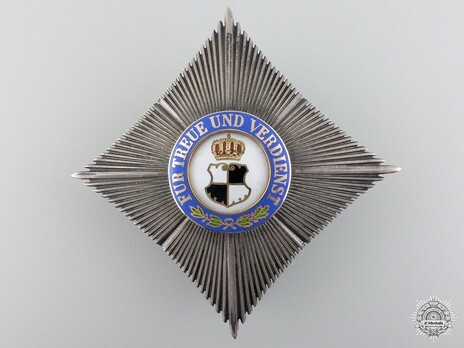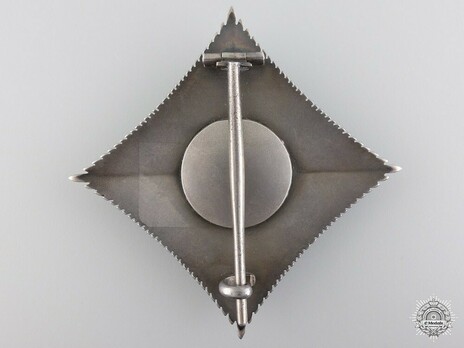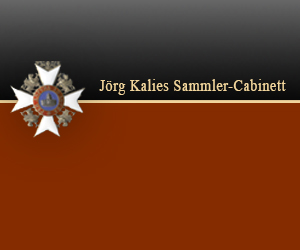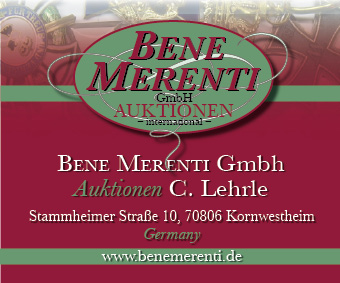House Order of Hohenzollern, Type II, Civil Division, Honour Commander Breast Star
CATEGORY: Version
SKU: 01.HOZ.0101.205.01.000
Estimated market value:


Estimated market value:
A silver, four-pointed star, the obverse centre features a gold medallion, presenting a white-enamelled centre bearing the Hohenzollern coat of arms (a quartered shield of black and white) under a princely crown, around the medallion is a gold-rimmed band of blue enamel bearing the motto in gold letters FÜR TREUE UND VERDIENST (FOR LOYALTY AND MERIT), with a small wreath of oak leaves below the inscription, the reverse centre plain, featuring a vertical principle pin assembly, unmarked, measuring 73.81 mm (w) x 74.13 mm (h), weighing 46.1 grams, and in near extremely fine condition.
A diamond-shaped four-sided star, constructed of silver and enamel. The centre medallion is enamelled in white and features the black-and-white Hohenzollern coat of arms with a narrow golden border, above which is a golden crown with red lining. The medallion’s ring is enamelled in blue with a golden border and features the golden inscription ‘FÜR TREUE UND VERDIENST’ (‘for loyalty and merit’) with two small decorative twigs in green and narrow golden borders at the bottom. The reverse is smooth with a pinback.
The House Order of Hohenzollern was founded by Prince Konstantin of Hohenzollern-Hechingen and Prince Karl Anton of Hohenzollern-Sigmaringen on December 5, 1841, and was conferred upon individuals who rendered meritorious service to the princely house.
The order originally featured five grades, including three crosses and two medals.
In 1852, the two Hohenzollern principalities were annexed by Prussia. The Prussian government expanded the order and it continued to be awarded in Hohenzollern as a princely House Order.
The order underwent several expansions and was reorganised numerous times throughout its history.
In 1866, crossed swords were added to the grades that were conferred in recognition of military merit.
In 1891, the grade of Honour Commander Cross was added to the order.
In 1910, Gold and Silver Crosses of Merit were added as grades to the order.
During the First World War, the order grades awarded with swords were conferred in recognition of outstanding leadership skills and bravery in the face of the enemy.
In 1916, the order statues were revised and it was determined that only military personnel with the rank of Major General or Colonel, who had received the II Class Decoration of a Prussian Order, were eligible to receive the Honour Commander Cross with Swords.
The order continued to be awarded throughout the Weimar Republic and the Third Reich.
In 1935, King Carol II of Romania became a prince of the House of Hollerzollern and was given the right to confer the order in Romania.

Comments
Sign in to comment and reply.


Scroll Top